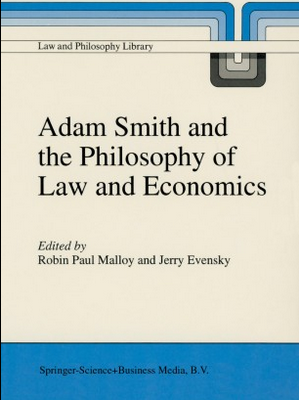Newly released
This book is new and will be uploaded as soon as it becomes available to us and if we secure the necessary publishing rights.

Adam Smith and the Philosophy of Law and Economics Book PDF
(0)
Author:
Robin Paul MalloyNumber Of Reads:
64
Language:
English
Category:
Social sciencesSection:
Pages:
226
Quality:
excellent
Views:
1091
Quate
Review
Save
Share
New
Book Description
Adam Smith and the Philosophy of Law and Economics is a unique book. Malloy and Evensky bring together a team of international and interdisciplinary scholars to address the work of Adam Smith as it relates to law and economics. In addition to their own contributions, the book includes works by Dr. John W. Cairns of the University of Edinburgh, Dr. J. Ralph Lindgren of Lehigh University, Professor Kenneth A.B. Mackinnon of the University of Waikato, and the Honorable Richard A. Posner of the United States Circuit Court of Appeals. Together these authors bring expertise from the areas of law, philosophy, history, economics, and law and economics to a new study of Adam Smith and his work.
Part One of the book presents new and important observations on Smith's views on community, ethics, the court system, criminal law, and delictual or tort law liability. In this part of the book Smith's work is also examined from the perspective of his use as persuasive authority in the works of modern legal economists. In Part Two the `living Smith' is explored by way of a debate between two major contributors in the field of law and economics. The debate and its analysis create a unique and contemporary opportunity to study Smith as a foundational source in the midst of a current academic and social policy dispute.
The understanding of Adam Smith that emerges from this book is new and complex. It will challenge the one-dimensional portrayals of Smith as a promoter of self-interest and it will correct many of the misinterpretations of Smith that are currently fashionable in the worlds of law and economics and the philosophy of law.
Robin Paul Malloy
Professor Robin Paul Malloy is the E.I. White Chair and Distinguished Professor of Law, and the Kauffman Professor of Entrepreneurship and Innovation. He is a leading expert on property, real estate transactions, land use law and zoning, and on law, markets, and marketization. He is a pioneer in his work at the intersection of land use law and disability law. Several of his works on market theory and law are translated into Chinese, Spanish, and Japanese. Professor Malloy has published nineteen books (4 with Cambridge University Press) and over 30 scholarly articles, in addition to numerous book chapters and essays. His latest book is titled Law and the Invisible Hand; A Theory of Adam Smith’s Jurisprudence (Cambridge 2021). He is a series editor on collections for Cambridge University Press, Routledge, and Edward Elgar. Malloy’s casebook on Real Estate Transactions (with Smith, now in its 5th edition) is the leading book on the subject and is used at law schools across the country. His casebook on Land Use Law and Zoning is now in its second edition (with Malagrino). Malloy has been the Sun Life Research Fellow at Oxford University, U.K.; the Dickenson Dees Fellow at University of Durham, U.K.; and for three consecutive summers served as a teaching fellow in China (Beijing and Shanghai) with the Committee on Legal Education Exchange with China. He currently serves on the International Advisory Board for the Law and Economics Program at St. Gallens University, Switzerland, and is a member of the Turin School of Local Regulation, Turin, Italy.
Malloy is the founding president of the Association for Law, Property, and Society. He Currently serves on the Board of the Veterans Heath Research Institute of CNY. He served on the Board of the National Italian American Bar Association for 20 years and was Vice Chair of the Zoning Board of Appeal for the Town of DeWitt, NY for 10 years. He has also served on numerous committees of the Association of American Law Schools.
Read More
Book Currently Unavailable
This book is currently unavailable for publication. We obtained it under a Creative Commons license, but the author or publisher has not granted permission to publish it.
Rate Now
5 Stars
4 Stars
3 Stars
2 Stars
1 Stars
Adam Smith and the Philosophy of Law and Economics Quotes
Top Rated
Latest
Quate
Be the first to leave a quote and earn 10 points
instead of 3
Comments
Be the first to leave a comment and earn 5 points
instead of 3